Introduction of the Poem:
This poem appeared in The Exact Name (1965). It outlines the method that a poet should adopt to achieve success in his chosen vocation of writing poetry. He gives the analogy of a lover and a birdwatcher here to illustrate his point. In each case, illumination or fulfilment comes through a patient wait and through silent perseverance.
Summary of the Poem:
Birdwatchers and lovers never force themselves to make haste; they know that in order to succeed in birdwatching and love, they have to be patient and preserving to achieve success. In the same way, the best poets do not force themselves to compose verses all the time. They wait forwards to come to the tips of their pens. Their best poems are written spontaneously. A good poem is never written after a lot of toil; it is not a laborious task. It is written only when the poet is inspired to do so.
Thus the quest for success in these spheres is a matter of patient waiting. A birdwatcher who desires to spot and see a rare bird sits relaxed on a hill and observes the movements of such a bird fluttering wings timidly or hesitatingly. A lover also has to wait patiently till the object of his desire decides to surrender herself to him even though she believes that she is taking a certain amount of risk in doing so. In these two examples, the poet would find the right parallels; he can draw a moral and wait patiently till inspirations dawn on him before he can put his pen to paper.
Slow movement and patience in all these cases is the key to success in the cases of the birdwatcher and the lover. In order to find and spot rare birds, a birdwatcher has to go to deserted places or near the source of a silently flowing river, or to a remote and difficult - to - reach seashore. For this, a lot of patience is required. Similarly, a lover has to persevere and wait till his beloved's attitude towards him undergoes a change and from a human being of flesh and bone, she turns into a spirit radiating light though at the centre of her heart she still remains a mystery; she remains an enigma to the lover. Similarly, a poet has to patiently wait for the moment of illumination and inspiration if he waits long enough. At times, he may seem to have lost his bearings; he may be puzzled and confused. His faculties of hearing and seeing may seem impaired and immobilised. But they would be restored only if he waits long enough for such a reawakening.
Critical Analysis of the Poem:
Regarded as one of Ezekiel's finest poems in Poet, Lover, Birdwatcher, the poet has tried to define the art of writing poetry by giving the analogy of a man's perseverance in wooing and courting a woman, and a birdwatcher waiting patiently on a hill or by the seashore to sight rare birds. The essence of success in these pursuits is patience and perseverance. Writing poetry is not a matter of the will but a matter of inspiration which may take a long time to come. As Ezekiel says, “The best poets wait for words.” A poet has to wait patiently for the moment of inspiration just as a birdwatcher has to trudge long distances to sight some rare bird, and just as a lover must wait long enough for his beloved to respond to him and surrender herself to him despite her doubts and misapprehensions as well as the “risks” she is taking .
In this the poet finds his moral proved,
who never spoke before his spirit moved.
In this context, “The slow moment seems, somehow, to say much more.”
The analogies of the birdwatcher and the lover are apt; they describe the art and craft of a poet. Ezekiel's reasoning is valid and convincing. The poem has a cogent, compact and close - knit structure. Whatever imagery is there, it is vivid and realistic, as the image of a birdwatcher sitting relaxed on a hill to notice the movements of a timid bird, and the image of a woman who “risks surrendering” to the man who has patiently wooed and courted her when she finds, in course of time, that she is truly loved by him. Similes “like the heart's dark floor” and the metaphor “myths of light” add to the charm of the poem. Yeats has dealt with a similar theme in Adam's Curse in which a woman says: “We must all labour to be beautiful.” Poet, Lover, Birdwatcher has a lyrical quality with its felicity of word and phrase as well as structural compactness.





